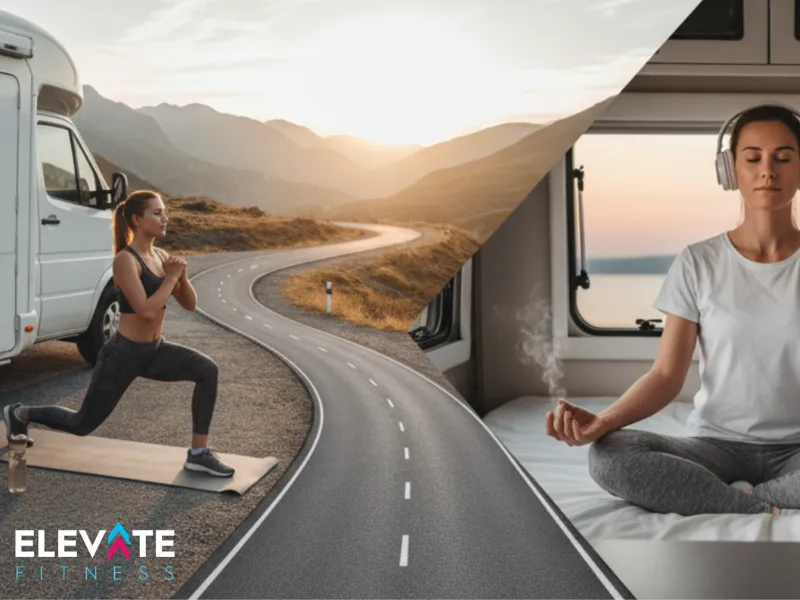
Certified Fitness Trainer Explains | Recovery on the Road: How to Train and Recharge While Traveling
In fitness culture, phrases like “no days off” and “grind now, glory later” get thrown around constantly. And while consistency is crucial, this mindset often misses a fundamental truth: recovery isn’t weakness — it’s part of the training process.
This becomes even more important during business travel, when schedules shift and sticking to a rigid routine becomes unrealistic. Instead of seeing travel as a setback, it’s time to understand how it can actually support long-term progress.
Training Adaptation Happens After the Workout
Physiologically, improvements in strength, endurance, muscle growth, and body composition don’t happen during your workout — they happen during recovery. Training provides the stimulus, but your body needs rest to adapt and rebuild.
Prolonged periods of high stress without recovery can lead to:
Elevated cortisol
Poor sleep quality
Reduced performance and energy
Increased risk of injury
For frequent travelers, this makes recovery not optional — but essential.
Active Recovery You Can Do Anywhere
Recovery doesn’t mean being sedentary. It means supporting your body’s ability to rebuild. While traveling, active recovery can look like:
• Walking through airports or exploring a new city instead of relying on transportation
• Bodyweight routines or resistance band workouts in your hotel room
• Light mobility work or swimming in the hotel pool
• Stretching, especially for hips, hamstrings, chest, and lower back after long flights or meetings
Evidence shows that low-intensity movement boosts blood flow, reduces stiffness, and speeds recovery between hard training sessions.
Mobility and Stretching: Essential for Travelers
Travel often means hours of sitting, which tightens the hip flexors, stresses the lower back, and stiffens the spine. Incorporating simple mobility exercises such as:
Seated figure-four
Hip flexor lunges
Cat-cow
Spinal twists
Hamstring stretches
…can restore mobility and reduce tension.
Research also shows that consistent mobility work can:
Reduce DOMS
Improve neuromuscular function
Enhance movement quality
Increase overall training readiness
You don’t need a full gym to stay sharp — you just need intention.
Nutrition and Hydration While Traveling
Travel can throw off eating patterns, but perfection isn’t the goal. Focus on nutrient-dense meals that support recovery:
Lean protein for muscle repair
Complex carbs for glycogen replenishment
Healthy fats for hormone balance
Hydration to counteract air travel dehydration
Electrolytes to maintain fluid balance and reduce fatigue
If business travel usually pushes you toward rushed meals or caffeine overload, this is a chance to slow down and re-establish mindful eating — even with limited options.
Short Breaks Don’t Equal Losing Progress
Here’s what research shows:
Strength and aerobic fitness can be maintained for up to two weeks with minimal decline, as long as you stay lightly active.
In fact, planned deloads — short periods of reduced training — are commonly used by athletes to replenish energy, prevent injury, and improve long-term progress.
Work travel can serve as a built-in deload when approached intentionally.
Final Takeaway
Recovery isn’t the opposite of training — it’s a crucial part of it. Travel, whether for work or leisure, doesn’t have to derail your fitness routine. When you reframe time away as an opportunity for active recovery, mobility work, and mindful nutrition, you return to your regular training feeling stronger, fresher, and more focused.
Progress isn’t built by pushing harder at all costs — it’s sustained by knowing when to pull back and recharge.
Ready to Train Smarter, Not Harder?
At Elevate Fitness in Dallas, Texas, we help busy professionals build strength and consistency through smart training, mobility work, and sustainable recovery strategies.
Looking for the best personal trainers in Dallas to help you stay on track even during travel?
👉 Book your FREE No Sweat Intro Session
or call us at (214) 302-9788 to get started.
